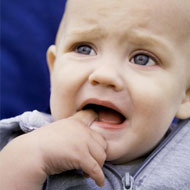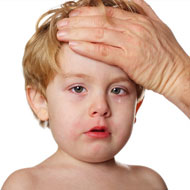Symptoms of Baby Teething
The baby teething process does not follow a set pattern and it differs from one child to the other. In other words, the initiation of the entire process along with its duration and the pain involved, have no set route. For example, one infant may cut a tooth overnight painlessly, while another may have to endure a long drawn, painful experience.
Sometimes the signs of teething may be visible in the form of a tiny lump or bump in the child’s gum for a few weeks, while at other times there may be no clue at all, till the tooth appears suddenly unannounced Children do not have the same number of teeth as adults. In fact they have 12 teeth lesser than the entire set of 32 permanent teeth that adults have.
Children have a total of 20 primary teeth. A majority of children have the complete set of these primary teeth by the age of three. The primary teeth last for just a few years of years, usually till the age of six, after which they get loose and begin to drop off gradually, starting with the ones that made their appearance first. The teeth keep falling till the child is about eleven to twelve years of age. Please bear in mind that the ages referred to above, as mentioned earlier, are just average estimates and the pattern will differ from child to child.
Symptoms of Baby Teething
Just as the pattern of teething differs from one child to the other, so do the symptoms. Some children may endure a painless experience, while for others, it is just the contrary. Some babies tend to get irritable as the tooth begins to push its way out of the gum.
The pain is usually the most when the first tooth is coming up, as the child gradually gets accustomed to the teething experience. The pain that is associated with the first tooth may also cause the baby to stay awake at night. The child may also begin to drool before the teeth begin to make their appearance. This is because teething is known to stimulate drooling. Occasional coughing is another symptom of teething. This is due to the excess saliva in the baby’s mouth on account of the drooling. Babies that are teething also begin to gum down and gnaw on anything that they can get their mouths on. Some of the other symptoms include a chin rash, cheek rubbing and a mild fever.


